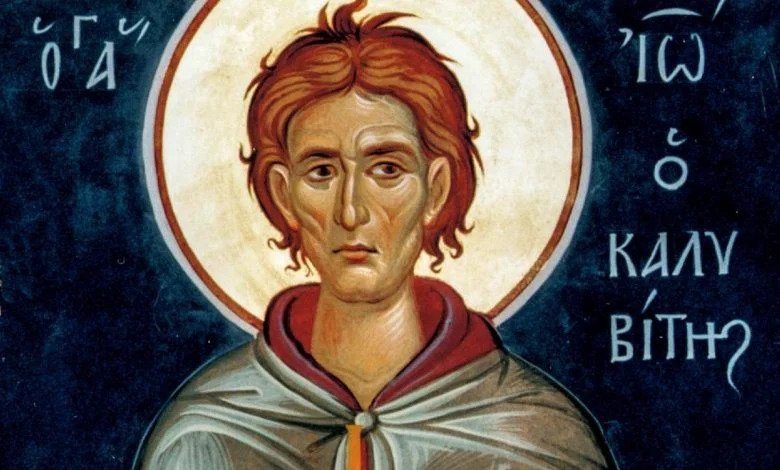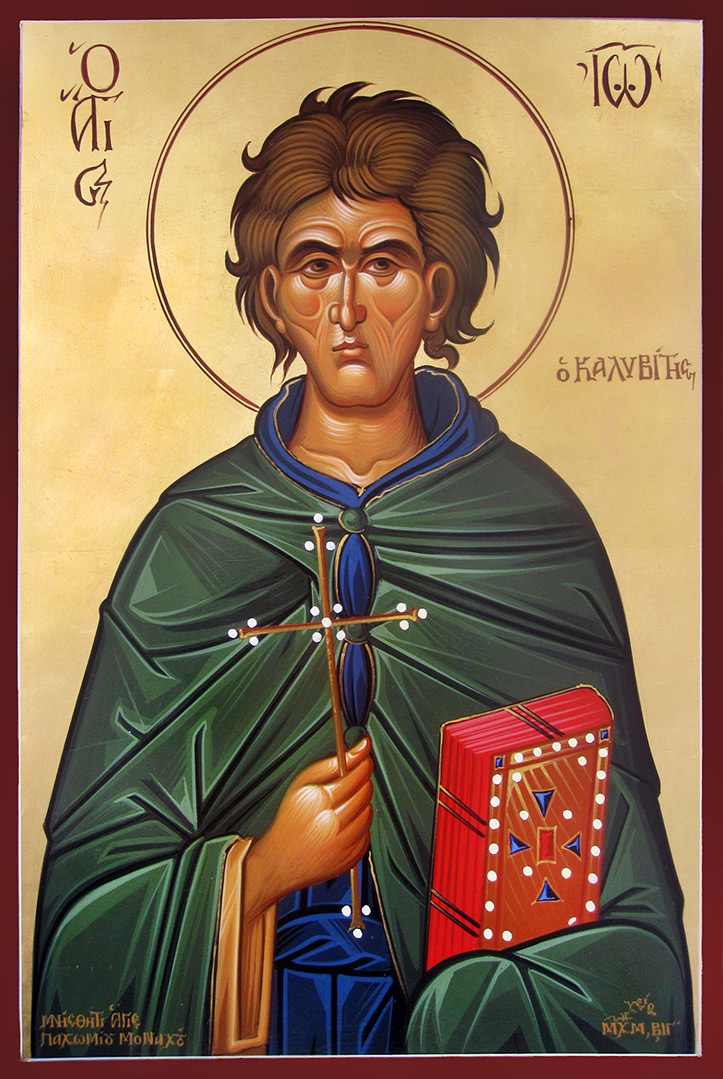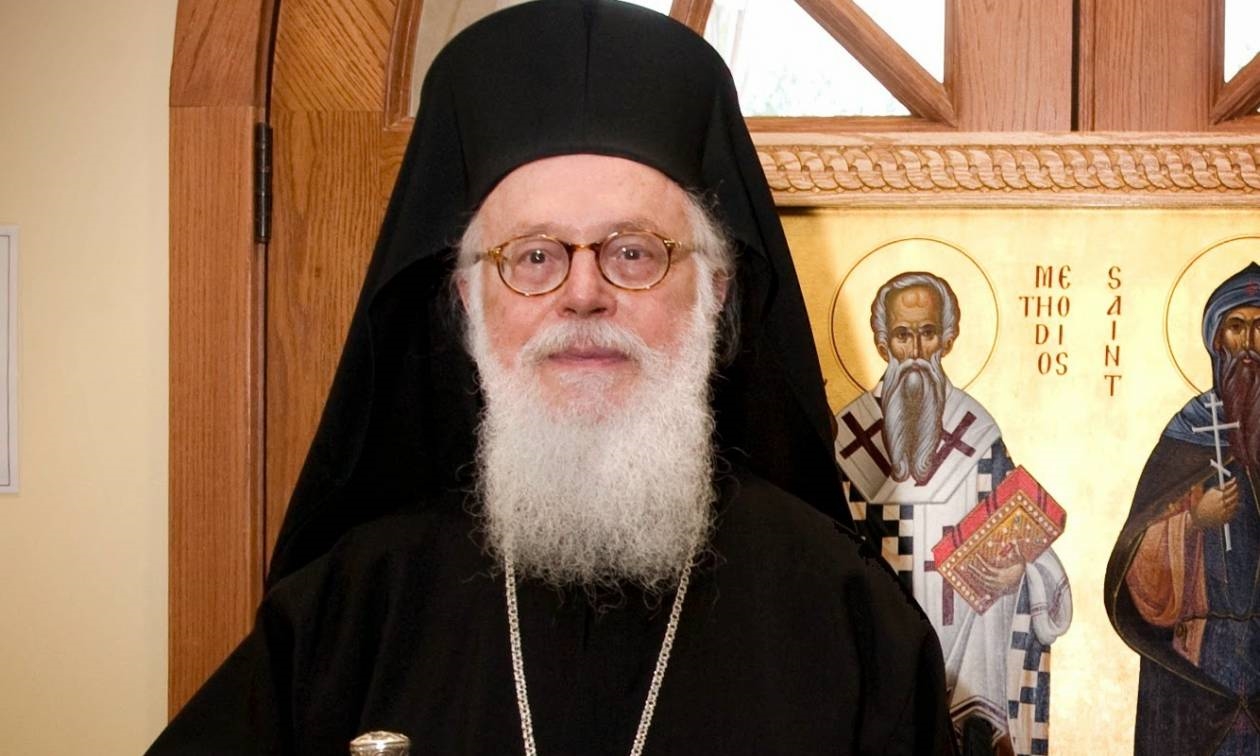Venerable Saint John Kalyvites (The Hut Dweller) (15 January)


Saint John the Hut-Dweller was the son of rich and illustrious parents, and was born in Constantinople in the early fifth century. He received a fine education, and he mastered rhetoric and philosophy by the age of twelve. He also loved to read spiritual books. Perceiving the vanity of worldly life, he chose the path that was narrow and extremely difficult. Filled with longing to enter a monastery, he confided his intention to a passing monk. John made him promise to come back for him when he returned from his pilgrimage to Jerusalem, and take him to his monastery.
He asked his parents for a Gospel so that he might study the words of Christ. John’s parents hired a calligrapher to copy the text, and had the volume bound in a golden cover studded with gems. John read the Gospel constantly, delighting in the Savior’s words.
The monk kept his promise to come back for John, and they went secretly to Bithynia. At the monastery of the “Unsleeping” (Akoimitoi), he received monastic tonsure. The young monk began his ascetical labors with zeal, astonishing the brethren with his unceasing prayer, humble obedience, strict abstinence, and perseverance at work.
After six years, he began to undergo temptations. He remembered his parents, how much they loved him, and what sorrow he caused them. He regretted leaving them, and was filled with a burning desire to see them again.
Saint John explained his situation to the igumen Saint Marcellus (December 29) and he asked to be released from the monastery. He begged the igumen for his blessing and prayers to return home. He bid farewell to the brethren, hoping that by their prayers and with the help of God, he would both see his parents and overcome the snares of the devil. The igumen then blessed him for his journey.
Saint John returned to Constantinople, not to resume his former life of luxury, but dressed as a beggar, and unknown to anyone. He settled in a corner by the gates of his parents’ home. His father noticed the “pauper,” and began to send him food from his table, for the sake of Christ. John lived in a small hut for three years, oppressed and insulted by the servants, enduring cold and frost, unceasingly conversing with the Lord and the holy angels.


Before his death, the Lord appeared to the monk in a vision, revealing that the end of his sorrows was approaching, and that in three days he would be taken into the Heavenly Kingdom. Therefore, he asked the steward to give his mother a message to come to him, for he had something to say to her.
At first, she did not wish to go, but she was curious to know what this beggar had to say to her. Then he sent her another message, saying that he would die in three days. John thanked her for the charity he had received, and told her that God would reward her for it. He then made her promise to bury him beneath his hut, dressed in his rags. Only then did the saint give her his Gospel, which he always carried with him, saying, “May this console you in this life, and guide you to the next life.”
She showed the Gospel to her husband, saying that it was similar to the one they had given their son. He realized that it was, in fact, the very Gospel they had commissioned for John. They went back to the gates, intending to ask the pauper where he got the Gospel, and if he knew anything about their son. Unable to restrain himself any longer, he admitted that he was their child. With tears of joy they embraced him, weeping because he had endured privation for so long at the very gates of his parental home.
The saint died in the mid-fifth century, when he was not quite twenty-five years old. On the place of his burial the parents built a church, and beside it a hostel for strangers. When they died, they were buried in the church they had built.
In the twelfth century the head of the saint was taken by Crusaders to Besançon (in France), and other relics of the saint were taken to Rome.
Saint John, who was from Constantinople, was the son of illustrious parents — Eutropius the Senator and Theodora. At twelve years of age he departed secretly from his home and went to the Monastery of the Unsleeping (see Dec. 29). Aflame with longing for his parents, he returned after six years to his father’s home in the guise of a pauper and beggar. Living in a small hut at the gates of his parents’ house (wherefrom he is called “hut-dweller”), he remained unknown therein for many years, and suffered mockery at the hands of those who had been his own servants. Foreknowing his death, he revealed himself to his parents, and within a few moments reposed, about the year 450.
John was born of wealthy and distinguished parents in Constantinople during the reign of Leo I. He was their only child. Drawn by an inclination for the spiritual life, the young John secretly fled with a monk to a monastery in Asia Minor. For six year in this monastery, he remained in the greatest abstinence, prayer and obedience toward the abbot. Then the devil assailed him with the temptation that he should leave the monastery, return home to his parents, and live with them there as a nobleman. Indeed, he did return to the home of his parents dressed as a beggar. He saw his parents but did not want to make himself known to them. He took up lodging as a beggar in their courtyard, living on the crumbs that the servants threw to him and enduring much ridicule from everyone. John lived thus for three years, constantly praying to God that He save the souls of his father and mother. When John fell ill and sensed death approaching, he made himself known to his parents–who recognized him by a precious book of the Gospels which they had given him in his childhood and which he had kept for himself as his only possession. And so, this young man, even though he was very wealthy, defeated the devil and saved his soul and the souls of his parents. He reposed in the Lord in about the year 450 A.D.
Apolytikion of John the Hut-Dweller
Fourth Tone
Since thou hadst with fervour longed after the Lord from thy youth, * thou leftest the world with its delights and nobly didst strive in valiant ascetic deeds. * Thou didst pitch thy hut before the gates of thy parents; * thou didst break the demons’ snares, O all-blessed Father. * And therefore, as is meet, hath Christ God glorified thee, O John.
Kontakion of John the Hut-Dweller
Second Tone
Since thou didst desire a poverty like unto Christ’s, O wise Father John, thou didst forsake thy parents’ wealth; and while holding in thy hands the most holy Gospel, O righteous one, thou didst follow after Christ God while ceaselessly praying to Him for us all.
Source: oca.org / goarch.org / westserbdio.org




